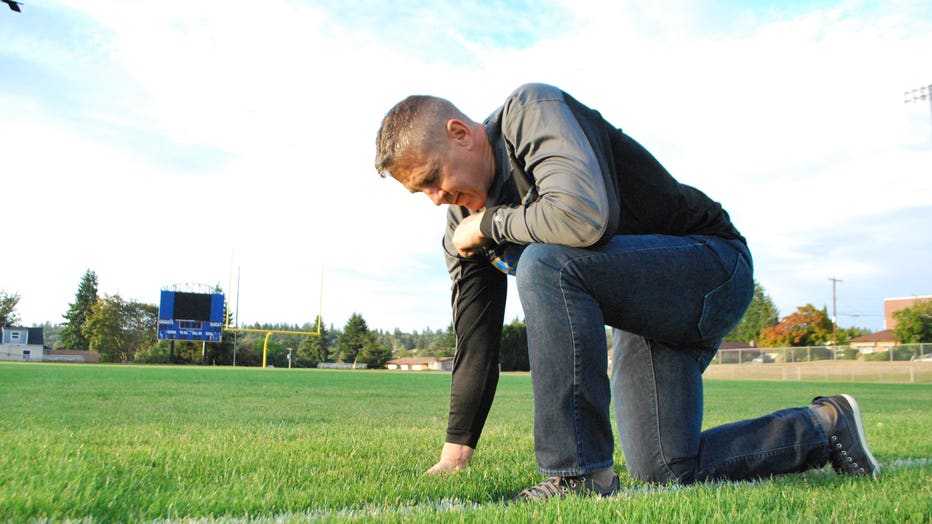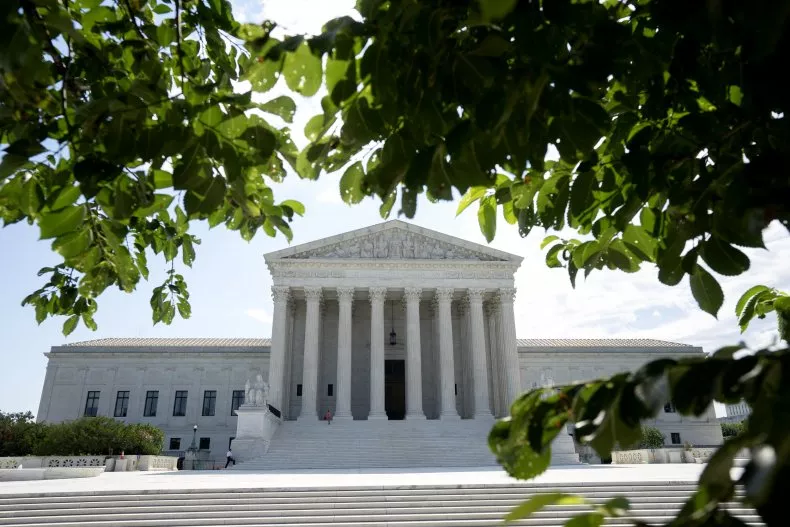Back in January, Seattle's FOX 13 TV along with other local TV stations, reported that former Bremerton, Washington football coach---Joe Kennedy's case for religious freedom would be heard by the Supreme Court later this year.
The local story became a national story.
Next Monday, April 25, his case will be heard by the highest court in the land.
While it's about Coach Kennedy getting his job back at Bremerton High, it's also about religious freedom in a nation that was founded by people seeking religious freedom.
Be informed, not misled.
How Coach Kennedy committed the unpardonable sin against the State.
After being denied his rights to religious freedom by two courts, Fox 13 TV and other local television stations announced in January that the Supreme Court had agreed to hear his case.
They are scheduled to hear it on April 25th. Next Monday.
Seattle's Fox 13 said this in January:
"Former Bremerton High School coach Joe Kennedy’s lawyers say the religious beliefs of their client, who is Christian, 'compelled him to give thanks through prayer at the conclusion of each game for what the players accomplished and for the opportunity to be part of their lives through football.' After games had ended and after both teams’ players and coaches met at midfield to shake hands, Kennedy would kneel and offer a silent or quiet prayer."
Fox 13 continued: "His practice evolved, however. Students came to join him, and he eventually began to give motivational speeches that often included religious content and a short prayer."
"The school district says that when it learned what Kennedy was doing it tried to accommodate him, asking that he pray separately from students. But the district says Kennedy ultimately declined to change his practice, was put on paid leave, and sued. Lower courts sided with the school district," Fox said.
Kennedy's perseverance.
This is part of the transcript from their conversation:
"Coach Joe Kennedy has had a heck of a life. From the start, all the odds were against him. His adopted parents abandoned him when he was a boy, and he had to fend for himself. After high school, he joined the military, and for his 20-year career in the Marine Corps, he was practically an atheist. Then he returned home and became a high school football coach, and everything changed. He became a believer. One night, he put on a movie, "Facing the Giants," which includes a coach who prays on the 50-yard line. He made a covenant with God to pray after every game. It cost him his job. Now, he’s facing the Supreme Court to defend his right to quietly pray in public after football games. He just wants his job back and his faith protected. But the outcome of the case will affect the First Amendment rights of teachers and coaches all across America, and it will answer an important question: Is America still a free country?"
Is America still a free country?
Seattle's KOMO TV News has been following Coach Kennedy's case from the beginning.
KOMO reports that Jeremy Dys, Special Counsel For Litigation & Communications for First Liberty Institute that represents Kennedy says: "What they have to answer is 1 simple thing: Whether or not Coach Kennedy violated the constitution by taking a knee in private prayer by himself for 15-30 seconds after a football game."
Dys said Kennedy should have been able to do that freely without fear of losing his job.
But according to the school district’s legal team, Kennedy was still on duty when he prayed on the field and his actions put undue pressure on students to join in.
"Church/state separation, which is guaranteed by all of us by our Constitution, means that no child should have to choose between being part of a team and their religious freedom. And that’s what happened in this case," said Rachel Laser, President & CEO of Americans United for Separation of Church and State.
Both sides say whatever the court decides will likely have a big impact on Bremerton and beyond.
Rev. Gregory Reffner with Brownsville United Methodist Church says: "If the Supreme Court does side with the Bremerton School District, I think that’s one more piece of evidence that Christians no longer dominate this country. And I say this as a Christian clergyperson-- I think that is a good thing."
Paul Peterson, a parent who has had 4 of his 5 kids graduate from Bremerton High, says: "If the court rules in his favor, what can happen to our schools? Will it become a religious free-for-all where it’s being pushed in the kids’ faces? Or... who knows. It’s really Pandora’s box. You don't know what's going to happen."
The Defense of Freedom Institute for Policy Studies joined forces with former U.S. Secretary of Education Betsy DeVos to fight for Coach Kennedy's First Amendment right to silent prayer in this case.
She says: “It’s unbelievable this case even has to be heard at the Supreme Court. If a teacher or coach can’t silently pray while employed at a public school, what is left of the First Amendment for them? The idea that the ‘separation of church and state’ is some sort of invitation for the government to forcefully separate people from their faith is appalling. The Court has been right on this in the past, and I hope they strongly affirm it again: No one must be forced to ‘shed their constitutional rights to freedom of speech or expression at the schoolhouse gate."
Kelly Shackelford, President, CEO, and Chief Counsel for First Liberty Institute wrote an article for Newsweek two years ago explaining how the First Amendment is being increasingly challenged.
In the article, he noted that for the first almost 100 years of our republic, there were zero cases decided by the U.S. Supreme Court concerning the Free Exercise Clause of the First Amendment, and 110 years passed before the high court heard a case on the First Amendment's Establishment Clause—and then not another case on either clause for another 41 years after that.
Since 1940, litigation on religious liberty has exploded at an alarming rate in nearly every area of religious life: school prayer, legislative prayer, release time education, religious land use, distribution of religious literature, conscientious objection, wearing religious head coverings in military service, the Pledge of Allegiance, religious beard length and so forth.
Our country has witnessed a barrage of litigation directed at the fundamental freedom of religious liberty—more than 75 cases since 1940. The numbers do not lie: It took 110 years to see three Supreme Court cases challenging religious liberty, but only 80 years to litigate more than 75 more. Religious freedom has been under increasing siege for eight decades now.
Shackelford echoes our Founding Fathers, saying: "Religious freedom is not the default experience for human history. It will not protect itself against the siege laid at its gates. That duty falls to you and me."
Be Informed. Be Engaged. Be Vigilant. Be Discerning. Be Prayerful.



